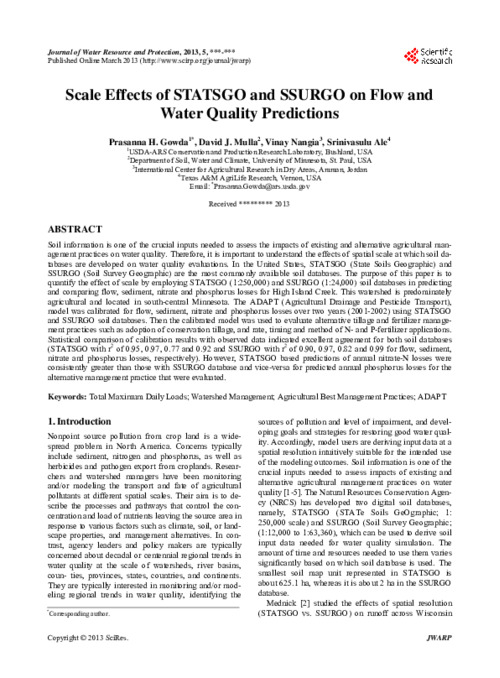Scale Effects of STATSGO and SSURGO on Flow and Water Quality Predictions
Abstract
Soil information is one of the crucial inputs needed to assess the impacts of existing and alternative agricultural man- agement practices on water quality. Therefore, it is important to understand the effects of spatial scale at which soil da- tabases are developed on water quality evaluations. In the United States, STATSGO (State Soils Geographic) and SSURGO (Soil Survey Geographic) are the most commonly available soil databases. The purpose of this paper is to quantify the effect of scale by employing STATSGO (1:250,000) and SSURGO (1:24,000) soil databases in predicting and comparing flow, sediment, nitrate and phosphorus losses for High Island Creek. This watershed is predominately agricultural and located in south-central Minnesota. The ADAPT (Agricultural Drainage and Pesticide Transport), model was calibrated for flow, sediment, nitrate and phosphorus losses over two years (2001-2002) using STATSGO and SSURGO soil databases. Then the calibrated model was used to evaluate alternative tillage and fertilizer manage- ment practices such as adoption of conservation tillage, and rate, timing and method of N- and P-fertilizer applications. Statistical comparison of calibration results with observed data indicated excellent agreement for both soil databases (STATSGO with r2 of 0.95, 0.97, 0.77 and 0.92 and SSURGO with r2 of 0.90, 0.97, 0.82 and 0.99 for flow, sediment, nitrate and phosphorus losses, respectively). However, STATSGO based predictions of annual nitrate-N losses were consistently greater than those with SSURGO database and vice-versa for predicted annual phosphorus losses for the alternative management practice that were evaluated

